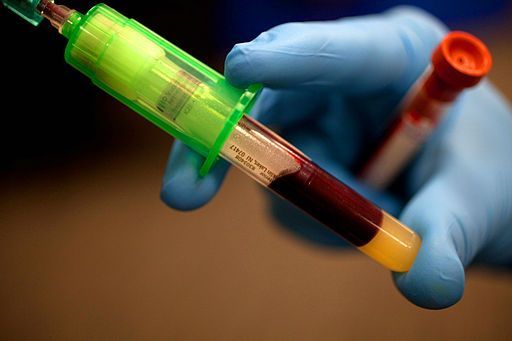A new blood test for fibromyalgia is more accurate than previously thought and will not confuse the chronic pain disorder with other diseases such as lupus and rheumatoid arthritis, according to the physician who developed the test.
“We have not seen any overlap between the biomarkers in fibromyalgia and the immune system patterns of patients with rheumatoid arthritis or lupus. That really takes the air out of the sails of any naysayers that are out there,” said Bruce Gillis, MD, founder and CEO of EpicGenetics, a bioresearch company based in Santa Monica, CA.

A new blood test for fibromyalgia is more accurate than previously thought and will not confuse the chronic pain disorder with other diseases such as lupus and rheumatoid arthritis, according to the physician who developed the test.
“We have not seen any overlap between the biomarkers in fibromyalgia and the immune system patterns of patients with rheumatoid arthritis or lupus. That really takes the air out of the sails of any naysayers that are out there,” said Bruce Gillis, MD, founder and CEO of EpicGenetics, a bioresearch company based in Santa Monica, CA.
EpicGenetics introduced the FM test in March, calling it the first definitive blood test for fibromyalgia, a poorly understood disorder that is characterized by deep tissue pain, fatigue, headaches, depression and lack of sleep. Test results are usually available in about a week.
The FM test looks for protein molecules in the blood called chemokines and cytokines, which are produced by white blood cells. Fibromyalgia patients have fewer chemokines and cytokines in their blood, according to Gillis, and as a result have weaker immune systems than normal patients.
Critics have said the same immune system biomarkers can be found in people with other illnesses, such as rheumatoid arthritis, making the blood test unreliable.
However, in new research involving over 300 patients with either fibromyalgia, lupus or rheumatoid arthritis, Gillis said only fibromyalgia patients were found to have below normal levels of chemokines and cytokines.
“They do not have the same immune system biomarkers. Not at all,” Gillis toldNational Pain Report. “The patterns we see in lupus and rheumatoid arthritis, we see this inflammatory process. But we don’t see the same biomarkers in fibromyalgia.”
Gillis said the research is still being finalized and he hopes to have it published in a peer-reviewed medical journal in the next few months.
When the FM test was first introduced, EpicGenetics said it was 93% accurate in diagnosing fibromyalgia. Gillis says the sensitivity of the test is now estimated at 99%, which is about the same as the test used to diagnose HIV.
Dr. Bruce Gillis
The National Institutes of Health estimates that 5 million Americans suffer from fibromyalgia – and millions more around the world – but so far only a few hundred have signed up to take the FM test. Gillis says the $744 cost, which is generally not covered by health insurance, could be a barrier to many patients.
“A lot of people who’ve been diagnosed with fibromyalgia don’t work. And because they don’t work they don’t have the wherewithal to pay for a test. They don’t have health insurance,” said Gillis, adding that some insurers have paid for the test in worker compensation cases.
“When we first started, it cost us $12,500 to analyze a patient’s immune system parameters. So we’ve brought the price way, way down.”
Gillis hopes to bring the price of the FM test down further by licensing other labs to draw the blood and ship blood samples to EpicGenetics.
Regardless of the cost, fibromyalgia patients are excited that a simple test may finally be available to diagnose a disorder that their doctors and loved ones are often skeptical of. It takes three to five years for the average fibromyalgia patient to be diagnosed.
“Having a reliable blood marker will do more than validate us as patients. It will open a field of dreams and possibilities for researchers compassionate about defining this horrible disorder,” said Celeste Cooper, a fibromyalgia sufferer and patient advocate.
“Once we have a biological test, we will know that study participants do indeed have fibromyalgia. There will be no skewed results, and the talk of psychological illness will be in our review mirror. This is a savory thought.”
In recent months, there have been several potential breakthroughs in fibromyalgia research.
Researchers at Ohio State are in the initial stages of developing another type of blood test for fibromyalgia. Using a high powered infrared microscope, they’ve identified a pattern of molecules in the blood that appears to be unique to fibromyalgia patients.
Another team of researchers in upstate New York has found that fibromyalgia patients have excess sensory nerve fibers in the blood vessels of their hands, which may disrupt the flow of blood throughout the body.
“In less than six months we have two studies reporting on successful analysis of fibromyalgia using blood markers. It appears to now enter a realm way beyond more than a debate,” says Cooper.
“It is a win for the scientific community and a win for the patient. I doubt this is the last. Expect more research, because the race is on and what a glorious race it will be for those of us who live with fibromyalgia every single day.”
Research could also lead to the discovery of a genetic marker for fibromyalgia – a gene that makes certain people more likely to develop the disorder.
EpicGenetics is saving many of the blood samples it gets from patients who take the FM test, in the hope of someday having them analyzed for RiboNucleicAcid (RNA), molecules involved in the synthesis of proteins and the transmission of genetic information.



